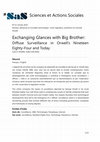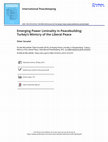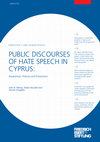Papers by Ozker Kocadal
Uluslararası ilişkiler dergisi, Sep 5, 2022
This study contributes to the human rights protection literature by using Fuzzy-set Qualitative C... more This study contributes to the human rights protection literature by using Fuzzy-set Qualitative Comparative Analysis (fsQCA) in the analysis of 76 cases composed of European Union and African Union countries. Results indicate that the ratification of treaties, establishment of human rights institutions, and high GDP per capita in the absence of rule of law, play crucial roles in the high rate of protection of human rights in Europe. In Africa, however, the low GDP per capita and absence of rule of law significantly weaken human rights protection. The analysis reveals that the establishment of human rights institutions is essential to protect human rights in Europe, while high GDP per capita and rule of law are paramount to improving human rights protection in Africa in relation to any institutional configuration, approach, or policy.
Peacebuilding, May 8, 2015

Sciences et actions sociales, Nov 19, 2019
Français / English L'objectif de cet article est de comparer les dispositifs de surveillance décr... more Français / English L'objectif de cet article est de comparer les dispositifs de surveillance décrits par G. Orwell dans son roman intitulé 1984, avec ceux mis en oeuvre dans la société contemporaine. Outre l'existence de similarités flagrantes entre la fiction et la réalité, on constate que le développement des outils technologiques a contribué à l'émergence d'une surveillance « diffuse ». Celle-ci se caractérise essentiellement par sa décentralisation et par l'implication d'acteurs variés (incluant aussi bien les institutions, les entreprises que les individus) qui jouent un rôle crucial dans la régulation sociale. This article compares the means of surveillance depicted by George Orwell in his novel Nineteen Eighty-Four with those used in contemporary society to identify similarities that exist between Orwell's fictional work and modern reality. Our analysis illustrates how technological developments have led to the emergence of a "diffuse" surveillance, which is a decentralized monitoring process that involves different sets of actors (including governments, companies and individuals) at varying degrees.

Negotiation Journal, Jul 1, 2016
In this article, I argue that kin states can play major roles in international mediation processe... more In this article, I argue that kin states can play major roles in international mediation processes involving their kin communities. Although kin states may be naturally biased toward their kin, kin states are sometimes actively involved in mediation processes and such involvement is even encouraged by third-party mediators. In this study, I divide the various roles assumed by kin states in mediation into four main conceptual categories: promoter, quasi-mediator, powerbroker, and enforcer. My analysis presumes that a kin state can use its close ties with its kin community to make third-party mediation more successful. I support and illustrate this model using cases of kin-state involvement in peace processes and examine both the benefits and complications that kin-state mediation can entail. This study contributes to scholarship examining the effectiveness of biased mediators. I conclude that the role a kin state assumes in a mediation is often context-dependent, but that third-party mediators and the international community can use their leverage over kin states to improve the peace process.
DOAJ (DOAJ: Directory of Open Access Journals), Dec 1, 2018
This article examines Syrian refugee-or migrant-themed cartoons in Turkish weekly satirical magaz... more This article examines Syrian refugee-or migrant-themed cartoons in Turkish weekly satirical magazines published between 2013 and 2017. In our analysis, we point out that as the Syrians' stay in Turkey has extended over the years, the refugees have become part of Turkish political discourse. We follow a social semiotic approach and categorize various cartoon representations of both Turkish politicians and Syrian refugees. We observe that cartoonists tend to portray this migrating population sometimes as an alterity, which is threatening the stability of the country, and sometimes as an "own kind", which should be integrated at all costs.
Social Anthropology, 2013

International Peacekeeping, 2019
International peacebuilding is no longer dominated by Western actors and their liberal peace fram... more International peacebuilding is no longer dominated by Western actors and their liberal peace framework, neither there is a full-fledged alternative formulated by emerging peacebuilding actors. In this paper, I first establish the relationship between the liminality of emerging powers and their mimicry of the liberal peace. Secondly, I distinguish three forms of mimicry in peacebuilding that stem from emerging power liminality: a discursive mimicry, a complete mimicry and a substantive mimicry. In the case of the discursive mimicry, there is a liberal peacebuilding discourse which is rarely substantiated with policies. The complete mimicry is when both the liberal discourse and the policies are mimicked, and the substantive mimicry is a genuine adaptation of the liberal peacebuilding by the emerging power. The case of Turkish peacebuilding is analysed to illustrate the tripartite distinction. I demonstrate that Turkey mimics solely the discourse of the democratic peace thesis, while there is a complete mimicry of the Western model in security sector reform. However, the Turkish civil society peacebuilding and Turkey's approach to economic development substantively mimic their liberal peace counterparts. This article contributes to the critical literature on liberal peacebuilding by identifying the different forms of emerging actors' mimicry of the liberal peace.

Negotiation Journal, 2016
In this article, I argue that kin states can play major roles in international mediation processe... more In this article, I argue that kin states can play major roles in international mediation processes involving their kin communities. Although kin states may be naturally biased toward their kin, kin states are sometimes actively involved in mediation processes and such involvement is even encouraged by third-party mediators. In this study, I divide the various roles assumed by kin states in mediation into four main conceptual categories: promoter, quasi-mediator, powerbroker, and enforcer. My analysis presumes that a kin state can use its close ties with its kin community to make third-party mediation more successful. I support and illustrate this model using cases of kin-state involvement in peace processes and examine both the benefits and complications that kin-state mediation can entail. This study contributes to scholarship examining the effectiveness of biased mediators. I conclude that the role a kin state assumes in a mediation is often context-dependent, but that third-party mediators and the international community can use their leverage over kin states to improve the peace process.
This study contributes to the human rights protection literature by using Fuzzy-set Qualitative C... more This study contributes to the human rights protection literature by using Fuzzy-set Qualitative Comparative Analysis (fsQCA) in the analysis of 76 cases composed of European Union and African Union countries. Results indicate that the ratification of treaties, establishment of human rights institutions, and high GDP per capita in the absence of rule of law, play crucial roles in the high rate of protection of human rights in Europe. In Africa, however, the low GDP per capita and absence of rule of law significantly weaken human rights protection. The analysis reveals that the establishment of human rights institutions is essential to protect human rights in Europe, while high GDP per capita and rule of law are paramount to improving human rights protection in Africa in relation to any institutional configuration, approach, or policy.
Uluslararası İlişkiler Dergisi
This study contributes to the human rights protection literature by using Fuzzy-set Qualitative C... more This study contributes to the human rights protection literature by using Fuzzy-set Qualitative Comparative Analysis (fsQCA) in the analysis of 76 cases composed of European Union and African Union countries. Results indicate that the ratification of treaties, establishment of human rights institutions, and high GDP per capita in the absence of rule of law, play crucial roles in the high rate of protection of human rights in Europe. In Africa, however, the low GDP per capita and absence of rule of law significantly weaken human rights protection. The analysis reveals that the establishment of human rights institutions is essential to protect human rights in Europe, while high GDP per capita and rule of law are paramount to improving human rights protection in Africa in relation to any institutional configuration, approach, or policy.
Déviance et Société, 2019
A travers une etude comparative entre les sites de prevention francais et anglais, il s’agit dans... more A travers une etude comparative entre les sites de prevention francais et anglais, il s’agit dans cet article de comprendre comment le cyberharcelement est apprehende par les divers acteurs tant officiels que non officiels. Apres avoir evoque dans une premiere partie l’influence de Dan Olweus dans la conceptualisation de ce phenomene, une analyse des discours vehicules par les sites preventifs en question est proposee : l’objectif est de voir en quels termes est decrite l’humiliation sur Internet en vue de sensibiliser les citoyens a de tels dangers. Enfin, une discussion des limites des mesures preconisees dans les deux contextes nationaux fait l’objet d’une troisieme partie.
This article examines Syrian refugeeor migrant-themed cartoons in Turkish weekly satirical magazi... more This article examines Syrian refugeeor migrant-themed cartoons in Turkish weekly satirical magazines published between 2013 and 2017. In our analysis, we point out that as the Syrians’ stay in Turkey has extended over the years, the refugees have become part of Turkish political discourse. We follow a social semiotic approach and categorize various cartoon representations of both Turkish politicians and Syrian refugees. We observe that cartoonists tend to portray this migrating population sometimes as an alterity, which is threatening the stability of the country, and sometimes as an “own kind”, which should be integrated at all costs.
L’objectif de cet article est de comparer les dispositifs de surveillance décrits par G. Orwell d... more L’objectif de cet article est de comparer les dispositifs de surveillance décrits par G. Orwell dans son roman intitulé 1984, avec ceux mis en œuvre dans la société contemporaine. Outre l’existence de similarités flagrantes entre la fiction et la réalité, on constate que le développement des outils technologiques a contribué à l’émergence d’une surveillance « diffuse ». Celle-ci se caractérise essentiellement par sa décentralisation et par l’implication d’acteurs variés (incluant aussi bien les institutions, les entreprises que les individus) qui jouent un rôle crucial dans la régulation sociale.
Publications by Ozker Kocadal

Report, Friedrich-Ebert-Stiftung Cyprus Office, 2021
This report focuses on hate speech prevalent in public discourses circulating on the internet, e.... more This report focuses on hate speech prevalent in public discourses circulating on the internet, e.g. social media users offensive comments under news articles, in both Greek and Turkish Cypriot communities of Cyprus. Traditional stereotypes used in daily language as well as discourses exhibited by media outlets in their representations of political events are examined. Some unflattering visual materials, such as cartoons which are ridden with discriminatory discourses about specific groups of people, are also studied. Three main nexuses of hate speech on both sides of the island are identified: intercommunal, inter-alterity and inter-gender. The hate speech incidents and the responses by authorities and civil society are similar on both sides of the island. Hate speech is a persistent problem for the Greek and Turkish Cypriot media despite all the efforts by bodies involved in media regulation. Although some progress has been made, the level of awareness concerning hate speech recognition remains low, and measures aimed at preventing hate speech fall short on both social and traditional media. On the basis of the findings presented in the report, we recommend both communities to form joint initiatives involving civil society, authorities and law enforcement agencies.
Revue Sciences et Actions Sociales, 2019
This article compares the means of surveillance depicted by George Orwell in his novel Nineteen E... more This article compares the means of surveillance depicted by George Orwell in his novel Nineteen Eighty-Four with those used in contemporary society to identify similarities that exist between Orwell’s fictional work and modern reality. Our analysis illustrates how technological developments have led to the emergence of a “diffuse” surveillance, which is a decentralized monitoring process that involves different sets of actors (including governments, companies and individuals) at varying degrees.
Déviance et Société, 2019
À travers une étude comparative entre les sites de prévention français et anglais, il s’agit dans... more À travers une étude comparative entre les sites de prévention français et anglais, il s’agit dans cet article de comprendre comment le cyberharcèlement est appréhendé par les divers acteurs tant officiels que non officiels. Après avoir évoqué dans une première partie l’influence de Dan Olweus dans la conceptualisation de ce phénomène, une analyse des discours véhiculés par les sites préventifs en question est proposée: l’objectif est de voir en quels termes est décrite l’humiliation sur Internet en vue de sensibiliser les citoyens à de tels dangers. Enfin, une discussion des limites des mesures préconisées dans les deux contextes nationaux fait l’objet d’une troisième partie.

Uploads
Papers by Ozker Kocadal
Publications by Ozker Kocadal